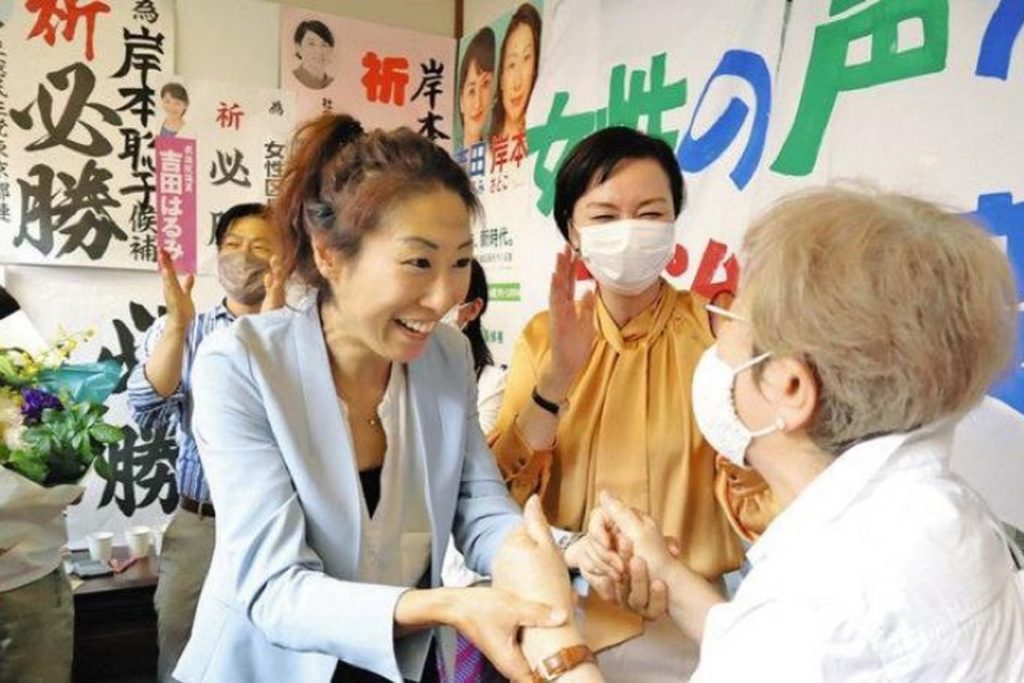Satoko Kishimoto is Tokyo ward’s first female mayor and she’s determined to bring ‘radical change’ to Japan’s long history of male-dominated politics.
Last month, Kishimoto was elected mayor of Suginami ward in Tokyo, becoming the first female leader in its 90-year history. In a country with low levels of female representation, Kishimoto said she decided to run for office to “promote democracy” and to champion causes close to her heart, such as labour rights and the environment.
“When I looked at Suginami and what local people faced there in terms of public services, childcare and urban planning, I thought something had to change and I believed I could do something with them and for them.”
Prior to running for mayor, the 47-year-old Kishimoto worked for 25 years as an environmental activist at Transnational Institute, a Dutch research organisation. She recently returned to Japan after a decade living in Belgium with her husband and two children. Despite her political opponents criticisms of her Belgian residency, she’s maintained such strong ties with Japan that this didn’t seem to sway most voters.
Her progressive candidacy for mayor of Suginami beat out the conservative incumbent by a close 187 votes and it was Japanese women who Kishimoto regards as driving her to claim victory in the election.
“Everything was a challenge– I wasn’t supported by any big organisations. But I had the support of individuals. To win an election, under those circumstances, was unheard of,” she said.
Kishimoto campaigned against wasteful public works projects and in support of better childcare services and conditions for low-paid contract workers, most of whom are women. She’s popular with the progressive movement in Japan and wants less privatisation and more citizen participation.
Knowledgeable on the future of public services like energy, water and health care, Kishimoto’s latest edited book, Reclaiming Public Services: How Cities and Citizens are Turning Back Privatisation, dives deep into the subject-matter. Through her environmental activism, she’s also engaged in the global water justice movement and supported local campaigns to fight against water privatisation.
Even though Kishimoto has many causes to champion on her agenda, she says her first priority is making the city’s working environment more comfortable for women.
“The reality is that it will take time. I want to see more women in management positions, but there is a huge hierarchy and women are not yet in a position to be able to step up,” she says.
At a news conference at the Foreign Correspondents’ Club of Japan, Kishimoto spoke out on the misogyny found in Japanese politics, saying that nationwide, women comprise just 2% of the political leaders of more than 1,700 municipalities.
Kishimoto also added that “Japanese politics is dominated by old men,” citing data showing that the average age of the mayors of Tokyo’s 23 wards was 67, with 40% in their 70s.
In Suginami, none of the heads of the 10 biggest departments are women, and the most senior political posts below that of mayor are occupied by men. Kishimoto points out that her own ward basically represents a typical Japanese organisation with such a low number of Japanese women in senior management corporate positions.
Soon after her speech, there was news that Japanese women nabbed a minor victory in their campaign against old men in politics with 35 of the 125 seats in upper house elections being taken by women. This makes for the highest proportion of seats with women since Japanese women won the right to vote and stand for parliament in 1946.
There’s still a long way to go, however, since Japan is the world’s third-biggest economy and yet, the international Inter-Parliamentary Union ranks it only 163rd out of 190 countries when it comes to women in politics.
With such a large gender-gap in Japanese politics, Kishimoto’s big win may have come as a surprise but she says there is also a “potential to bring about radical change.”


